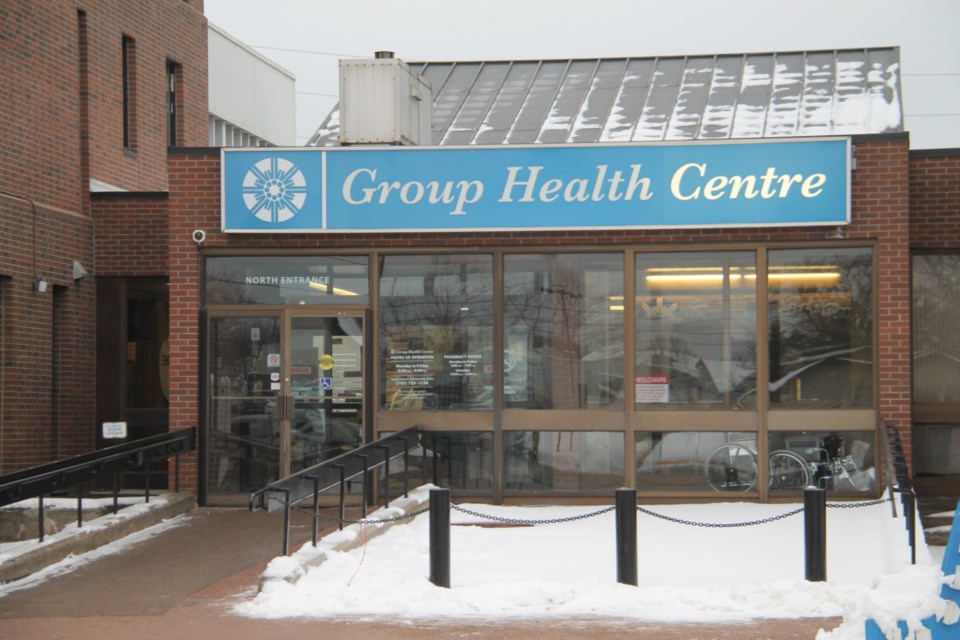The Ontario Medical Association is sounding the alarm over news that another 10,000 Group Health Centre patients will lose access to their primary care provider and same-day clinic services by May 31.
The stunning announcement was made Thursday by GHC officials in a news conference that included Sault MPP Ross Romano and Mayor Matthew Shoemaker.
“I can’t honestly think of a time where I’ve seen a situation like this all in one day,” said Dr. Andrew Park, Ontario Medical Association president, in an interview with SooToday.
GHC officials say if trends continue, an additional 6,000 patients on the facility’s roster are at risk of losing primary care in the near future. As SooToday reported last summer, Group Health had already "de-rostered" nearly 3,000 patients over the past six years, pinning the blame on lack of doctors.
Despite the huge number — 10,000 patients — the news did not come as a complete shock to the OMA.
“The situation around family medicine has been ongoing particularly in Ontario where we have among the lowest number of physicians per capita across the country," Park said. "It was completely predictable and it remains predictable for the future. What’s happening in the Sault is going to happen across the province unless we have a real strategy around primary care."
GHC said the current crisis has been fueled by physician retirements with no replacements on the horizon, fewer medical students choosing family medicine and family doctors leaving primary care due to an overwhelming amount of administrative paperwork.
Reducing the amount of paperwork that family doctors and nurse practitioners perform during a typical work week is seen as part of the solution to recruiting and retaining primary health care providers, the OMA president said.
“The family doctor is sitting there doing 19 hours of paperwork a week which is not really what you want your family doctor doing," Park said. "You want them taking care of patients. We need to streamline our system so that doctors are able to be doctors. I don’t think that’s an unreasonable ask."
Park said pressure needs to be taken off family doctors through a focus on “team-based care.”
Park said that taking pressure off overworked doctors can be done by focusing more on family health teams in which other healthcare professionals such as pharmacists can share the responsibility of patient care.
Dr. Jodie Stewart, Algoma District Medical Group CEO and chair, said Thursday that GHC is asking for emergency funding from the provincial government to stabilize operations and prevent more patients from losing their family doctors or nurse practitioners.
“Funding will always help but we also have to ensure where the funds are going to. That’s important,” Park said.
“We’ve called for an expansion of health teams to help take care of communities,” he reiterated.
“When we talk about costs I don’t see it as costs because these are investments in our communities and the health of Ontarians," Park said. "Every dollar that you spend for patients who have a family doctor is better spent than the intervention of care that they need afterwards if they get sick. It’s either pay now or pay later. It’s always going to be more expensive later."
Sault MPP Romano said Thursday that a task force to address the chronic Sault doctor shortage will be formed, and he wants that task force to have its first meeting on March 1.
Romano said the task force’s work will continue as a years-long project well beyond May 31 — the day 10,000 GHC patients will lose access to their primary care provider and same-day clinic services.
Park said he likes the idea of a task force but said “this was a situation brewing for over a decade.”
He said the province clearly needs to take action.
“We want to work very closely with the government but we need to make sure every Ontarian in this province has a family doctor. Full stop," he said. "We’re so far away from that and the profession and the public need a signal that this is going to be something this government is going to commit to.”
Park added the doctor shortage crisis began under previous provincial governments of all political stripes, starting in the 1990s.
“I think the warning has been out there for long enough and I’m concerned about what needs to happen going forward and whether we have that commitment from the government to ensure that everyone has access to care and that’s the bottom line. I’m not really as much about saying this is somebody’s fault versus saying it’s here, it’s time. ”
“We cannot have economic growth or prosperity in this province without health being the number one concern, for how we get Ontarians to their workplaces, to have healthy relationships, to have all the things that create a flourishing society. The backbone of our health system is family medicine so to see 10,000 patients in the Sault de-rostered is gut-wrenching. You know that their health will not be as good going forward because they don’t have a family doctor.”
“It’s very distressing. I know the physicians in the Sault didn’t do this without a heavy heart,” Park said of GHC physicians retiring or leaving the profession and leaving thousands of patients orphaned.
“We go into a profession of caring. This wasn’t overnight. This didn’t happen overnight so I feel for the physicians, I feel for the community, I feel for the patients of Sault Ste. Marie and I do believe that unless we do something this will continue across the province.”
Park said the OMA is ready to help GHC and the task force in addressing the Sault’s alarming family doctor shortage.
